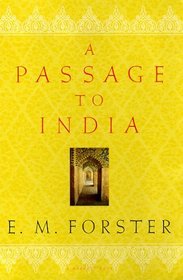Helpful Score: 2
A classic of the conflict between colonizer and the colonized in British India.
Helpful Score: 2
A window into other cultures, another time. Less entertaining than educational. But interesting none the less.
Helpful Score: 2
slow, very little plot. you do learn about India in the 1920's though.
Helpful Score: 1
An interesting tour through British colonial India.
Helpful Score: 1
Excellent book
Helpful Score: 1
Part of my British Lit studies. I liked it when paired w/ the movie.
I thought that the first part was slow and rather uneventful. A Muslim doctor is apparently friendly to many Anglos. In it he exposes the kaleidoscope of an ethnic, racial, cultural, and religious society that was India in the early 1900s, the dominance of the Anglo culture and their attitude towards the native Indians. Beyond the Indian social caste of birthright and occupation, there is also one of religious caste. The second part brings the true Anglo-Indian relations to a head. When the doctor is falsely accused of assaulting an Anglo woman, they turn tail and show their true colors. They rally round the (British) flag so to speak. All of the underlying bias and superiority of the British is exposed. Through this the doctor retains only one Anglo friend; however, the ordeal and the trial have strained their relationship. In part three, we see that all personal and cultural relationships have been unalterable strained.
What really happened in the Marabar caves? This is the mystery at the heart of E.M. Forster's 1924 novel, A Passage to India, the puzzle that sets in motion events highlighting an even larger question: Can an Englishman and an Indian be friends?
Written while England was still firmly in control of India, Forster's novel follows the fortunes of three English newcomers to India--Miss Adela Quested, Mrs. Moore, and Cyril Fielding--and the Indian, Dr. Aziz, with whom they cross destinies. The idea of true friendship between the races was a radical one in Forster's time, and he makes it abundantly clear that it was not one that either side welcomed. If Aziz's friend, Hamidullah, believed it impossible, the British representatives of the Raj were equally discouraging
Despite their countrymen's disapproval, Miss Quested, Mrs. Moore, and Mr. Fielding are all eager to meet Indians, and in Dr. Aziz they find a perfect companion: educated, westernized, and open-minded. Slowly, the friendships ripen, especially between Aziz and Fielding. Having created the possibility of esteem based on trust and mutual affection, Forster then subjects it to the crucible of racial hatred: during a visit to the famed Marabar caves, Miss Quested accuses Dr. Aziz of sexually assaulting her, then later recants during the frenzied trial that follows. Under such circumstances, affection proves to be a very fragile commodity indeed.
Arguably Forster's greatest novel, A Passage to India limns a troubling portrait of colonialism at its worst, and is remarkable for the complexity of its characters. Here the personal becomes the political and in the breach between Aziz and his English "friends," Forster foreshadows the eventual end of the Raj.
--Alix Wilber (amazon.com review)
Written while England was still firmly in control of India, Forster's novel follows the fortunes of three English newcomers to India--Miss Adela Quested, Mrs. Moore, and Cyril Fielding--and the Indian, Dr. Aziz, with whom they cross destinies. The idea of true friendship between the races was a radical one in Forster's time, and he makes it abundantly clear that it was not one that either side welcomed. If Aziz's friend, Hamidullah, believed it impossible, the British representatives of the Raj were equally discouraging
Despite their countrymen's disapproval, Miss Quested, Mrs. Moore, and Mr. Fielding are all eager to meet Indians, and in Dr. Aziz they find a perfect companion: educated, westernized, and open-minded. Slowly, the friendships ripen, especially between Aziz and Fielding. Having created the possibility of esteem based on trust and mutual affection, Forster then subjects it to the crucible of racial hatred: during a visit to the famed Marabar caves, Miss Quested accuses Dr. Aziz of sexually assaulting her, then later recants during the frenzied trial that follows. Under such circumstances, affection proves to be a very fragile commodity indeed.
Arguably Forster's greatest novel, A Passage to India limns a troubling portrait of colonialism at its worst, and is remarkable for the complexity of its characters. Here the personal becomes the political and in the breach between Aziz and his English "friends," Forster foreshadows the eventual end of the Raj.
--Alix Wilber (amazon.com review)
Ranked among the greatest novels of the 20th century, A Passage to India is now a Major Motion Picture directed by David Lean. This classic account of the clash of cultures in British India after the turn of the century ironically reveals the menace lurking just under the surface of ordinary misunderstanding. Carefully crafted and beautifully written, this is not a book about India alone, but about all human life.
A classic for anyone who loves to read and who aspires to write!
loved this book!!
The classic account of the clash of cultures in British India after the turn of the century.
Ranked among the great novels of the twentieth century. The classic account of the clash of cultures in British India after the turn of the century. Rebecca West




